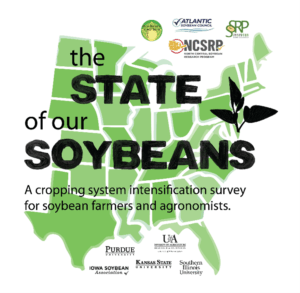 Hello to all of our faithful readers! I hope that the 2025 growing season has started to wind down for most of you and that you’re catching a well-deserved break before harvest season kicks into full gear. I’m writing this post to request your help once again with completing a survey (https://bit.ly/soy-survey) as a part of national research effort between agronomists and weed scientists. This survey will help provide insights into current soybean production practices, weed management strategies, and opportunities for the implementation of alternative production strategies.
Hello to all of our faithful readers! I hope that the 2025 growing season has started to wind down for most of you and that you’re catching a well-deserved break before harvest season kicks into full gear. I’m writing this post to request your help once again with completing a survey (https://bit.ly/soy-survey) as a part of national research effort between agronomists and weed scientists. This survey will help provide insights into current soybean production practices, weed management strategies, and opportunities for the implementation of alternative production strategies.Agricultural scientists from Kansas State University, Purdue University, the University of Arkansas, Southern Illinois University Carbondale, and the Iowa Soybean Association (in collaboration with the checkoff-funded North Central, Mid-South, South, and Atlantic soybean regions) would like your help in gathering soybean management information, perspectives on intensification methods (including double cropping and intercropping), and economics regarding these management strategies.
We would appreciate you taking the time to complete a survey regarding these concepts. The survey includes questions detailing production information (including agronomic and weed-control practices) for various soybean-based production systems, perspectives on intensification methods (including double cropping and intercropping), and the economics associated with such practices.
If you do choose to participate, we appreciate your feedback and all information will be kept confidential to the extent allowed by applicable State and Federal law. No names, contact information, precise locations, or computer IP addresses will be collected. By completing the survey, you are agreeing to allow the use of your responses for research purposes. If you do not wish to complete the survey, your refusal to do so will have not any effect on your relationship with the universities or entities listed. To opt out of taking the survey, simply do not complete the survey. Response volume updates by state and more information are available here: https://bit.ly/soy-survey-info.
If you have questions or concerns about this study, you may contact Dr. Rachel Cott (785-532-5402, email rveenstra@k-state.edu), Dr. Elizabeth (Beth) Yeager (785-532-4935, email eyeager@k-state.edu), or Dr. Thomas (Tommy) Butts (765-494-0598, email buttst@purdue.edu). If you have questions about your rights while taking part in the study or have concerns about the treatment of research participants, please call the Kansas State University Committee on Research Involving Human Subjects at 785-532-3224, email (comply@k-state.edu) or write to: Committee on Research Involving Human Subjects – K-State, 1601 Vattier St., Fairchild Hall #203, Manhattan, KS 66506-1100. To report concerns anonymously online, see https://www.k-state.edu/internalaudit/anonymous-hotline/.
Information gathered from the survey will provide direct insights into current soybean management practices across the United States, awareness and experience with intensification strategies in different cropping systems, and perspectives of economic and production benefits of these strategies by region. This will allow participating researchers to better understand soybean intensification needs and opportunities to prioritize in future research, teaching, and Extension efforts.
Please click on the link here (https://bit.ly/soy-survey) or scan the QR code below to access the survey. It should take approximately 15-20 minutes to complete.
Thank you for taking the time to complete the survey, and we look forward to your insightful responses. Good luck with wrapping up your cropping season!



